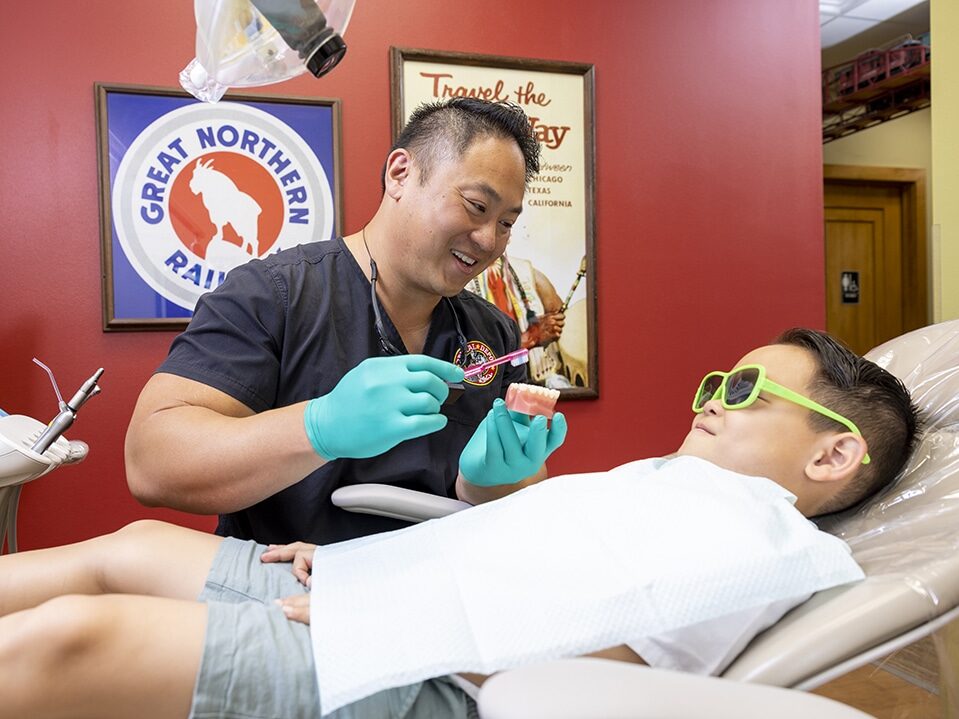Proper alignment of your jaws and teeth is important for healthy oral functioning, such as chewing, speech, and breathing. It can reduce tension and pressure on your jaws, reduce the chances of cavities and periodontal disease, and improve your confidence.
Orthodontic treatment addresses improper alignment—or malocclusion—and it varies widely from patient to patient. Some treatments may take a few months while others may take several years. On average, typical treatment takes between 12 and 36 months.
Before you begin any treatment, your orthodontist will conduct a thorough oral and facial examination, complete with x-rays, impressions, and/or a facial scan, to identify your orthodontic needs. Your individualized treatment plan will then be developed based on the current shape, placement, and structure of your teeth, jaw, and facial bones.

Younger patients have less dense teeth and their jaws and facial structure are still growing and moving. Treatment may take less time or may require less force to guide the teeth to the proper alignment. Older patients will require devices and procedures that apply more force over a longer period to achieve optimal alignment. Most orthodontic treatments begin between the ages of 9 and 14 when there are both baby and adult teeth present, and the facial structure is still growing. This allows the orthodontist to correct any existing problems and help guide future development.
Correcting crooked or crowded teeth generally takes less time than correcting an over- or underbite, or more serious jaw alignment issues. The less correction your current condition requires, the shorter your treatment time. Treatment that requires creating more space, extracting teeth, or readjusting alignment will take considerably longer than simply shifting a few teeth.
Every appointment during your treatment is important, as this is the time your orthodontist will evaluate progress and make the adjustments needed to continue. Following your orthodontist’s guidance about proper device usages—such as elastics or rubber bands—dental care, and diet is also important. Failure to do so can result in costly damages to your device or other setbacks to your treatment. Do not try to “speed up” your treatment by adjusting your devices yourself or exceeding recommendations; excessive force can cause your teeth and jaw to move where they shouldn’t.
How well you care for your teeth and your devices during your treatment can affect how long it takes. Regular brushing and flossing keep teeth and devices clean and intact, as does avoiding chewy, hard, sticky, and sugary foods. If you sustain damage to your braces or devices, schedule to have them repaired as soon as possible to ensure your treatment progresses as it should.
You may begin to see dramatic improvements well before the scheduled end of your treatment. However, this does not mean that your treatment should end early. Your orthodontist’s goal is to create the proper alignment in your teeth and jaw—both where you can see it and where you cannot. Your orthodontic treatment is unique to your teeth and is designed to produce healthy, long-lasting results. While the adjustments themselves may not take much time, making them permanent requires the bones in your jaw to harden around the changes.
Regardless of how long your specific treatment takes, your orthodontist will most likely prescribe either a permanent or removable retainer—or both—to help keep your teeth from shifting back. Proper retainer wear and care will be imperative to help maintain the results you just invested so much time and money in.
When choosing an orthodontist, be sure you choose one certified by the American Association of Orthodontists (AAO). In addition to completing traditional dental school, these specialists have also completed two to three years of residency in an accredited orthodontic program. This gives them the added medical expertise they need to accurately evaluate your orthodontic needs and apply the necessary treatment safely and effectively.
For more information on your orthodontic treatment options, or to schedule a complimentary consultation with one of our orthodontists, visit our website at dentaldepot.net/find-location to find an office near you.
